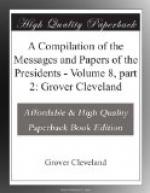These are some of the laws on this subject which it is the duty of the executive department of the Government to enforce. The intent and effect of the sixth section of this bill is to prohibit all the civil officers of the United States, under penalty of fine and imprisonment, from employing any adequate civil force for this purpose at the place where their enforcement is most necessary, namely, at the places where the Congressional elections are held. Among the most valuable enactments to which I have referred are those which protect the supervisors of Federal elections in the discharge of their duties at the polls. If the proposed legislation should become the law, there will be no power vested in any officer of the Government to protect from violence the officers of the United States engaged in the discharge of their duties. Their rights and duties under the law will remain, but the National Government will be powerless to enforce its own statutes. The States may employ both military and civil power to keep the peace and to enforce the laws at State elections. It is now proposed to deny to the United States even the necessary civil authority to protect the national elections. No sufficient reason has been given for this discrimination in favor of the State and against the national authority. If well-founded objections exist against the present national election laws, all good citizens should unite in their amendment. The laws providing the safeguards of the elections should be impartial, just, and efficient. They should, if possible, be so nonpartisan and fair in their operation that the minority—the party out of power—will have no just grounds to complain. The present laws have in practice unquestionably conduced to the prevention of fraud and violence at the elections. In several of the States members of different political parties have applied for the safeguards which they furnish. It is the right and duty of the National Government to enact and enforce laws which will secure free and fair Congressional elections. The laws now in force should not be repealed except in connection with the enactment of measures which will better accomplish that important end. Believing that section 6 of the bill before me will weaken, if it does not altogether take away, the power of the National Government to protect the Federal elections by the civil authorities, I am forced to the conclusion that it ought not to receive my approval.
This section is, however, not presented to me as a separate and independent measure, but is, as has been stated, attached to the bill making the usual annual appropriations for the support of the Army. It makes a vital change in the election laws of the country, which is in no way connected with the use of the Army. It prohibits, under heavy penalties, any person engaged in the civil service of the United States from having any force at the place of any election, prepared to preserve order, to make arrests, to keep the peace,




